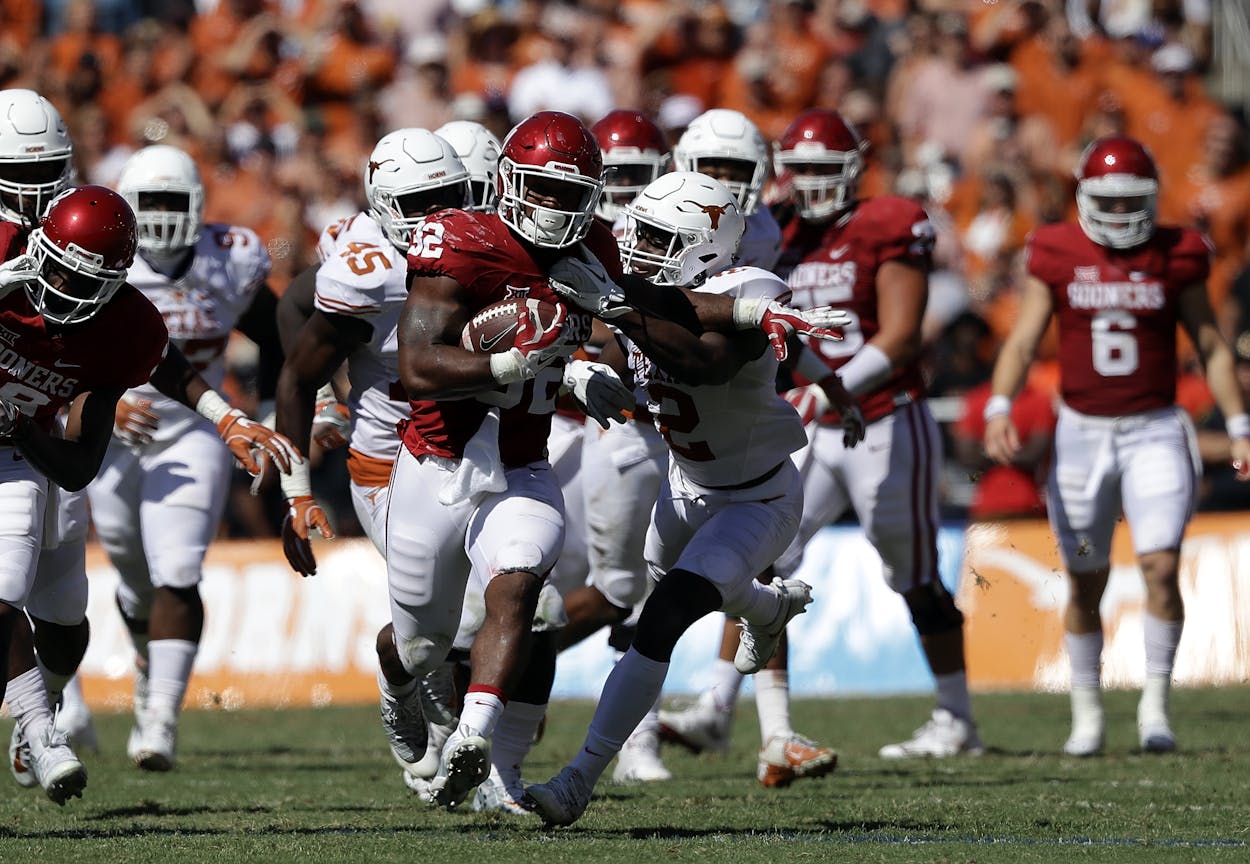The most dysfunctional Power 5 conference in the land is set to make an announcement Monday regarding expansion. The expected outcome is that the Big 12 will stand pat with only ten schools. If this feels like a slow, painful death, that’s because it is.
The Big 12 board of directors voted unanimously in July to have commissioner Bob Bowlsby explore expansion. This came on the heels of the conference announcing it would reinstate a championship game in 2017. It seemed like the Big 12 finally had a little momentum. Just the appearance of schools seeking membership provided a sense of stability for the first time in years. And, in fact, nearly twenty universities applied for membership this past summer. They wanted a seat at the adult table of college football, and the Big 12 was the only conference with openings.
But a familiar thing happened along the way: the two neighborhood bullies–Texas and Oklahoma–weren’t on the same page. Oklahoma president David Boren got the ball rolling back in June 2015 when he suggested the Big 12 was “psychologically disadvantaged” by having only ten schools.
“I think it’s something we should strive for while we have the time, stability, all of that to look and to be choosy,” Boren said at the time. “We can be very selective about who we want to add. It would have to add value to the conference. I think we should.”
Boren, a former U.S. senator, basically took over the role of conference commissioner, undercutting Bowlsby’s credibility. I’ve been shocked by how helpless Bowlsby has been throughout the past year. This is the man who hired Jim Harbaugh as the head coach at Stanford when he was the athletic director there. He’s also been one of the most outspoken critics of the NCAA and its enforcement policies. Watching him turn into Boren’s errand boy has been embarrassing.
This whole interview process now looks like a sham. There were reportedly eleven finalists. Memphis’ biggest benefactor, FedEx founder Fred Smith, was willing to sponsor the Big 12 championship game if his school landed a spot. Memphis wasn’t even a finalist.
The Big 12 once hoped to poach a couple of schools from the ACC, but that was always a pipe dream. (Had Florida State secretly dreamed of trips to Ames?) Meanwhile, the ACC has solidified its status as a Power 5 conference.
BYU and Houston rose to the top of the expansion list. But several LGBT organizations from around the country urged Bowlsby not to accept BYU based on the school’s discriminatory policies. And Houston’s candidacy seemed to gain traction when the University of Texas president and statewide politicians took to social media to express their support. It seemed odd that Governor Greg Abbott and Lieutenant Governor Dan Patrick would be so bullish on the Cougars, and it was soon revealed the University of Texas wanted to build a campus near the University of Houston. Who knew politicians might have ulterior motives?
Things were going just fine for Houston right up until the time it demolished the Sooners in the season opener. It wasn’t long before Boren was waffling.
“I would just caution you and say, I would not take expansion as a given,” Boren said in mid-September. “I would not take expansion as a sure thing.”
My read on Boren’s change of heart is that he wanted to remind the University of Texas it wasn’t running the show. And if that sounds like too petty of an explanation, I’ll point you to some of the reasons that caused Texas A&M to leave this conference, including a Longhorn Network that hasn’t lit up the ratings. The fact the Big 12’s TV partners were going to be forced to kick in extra money for additional teams may have also slowed the process.
If the conference chooses not to expand Monday, presidents from all ten schools need to meet and chart out the next eight years. With the current TV deal set to expire in 2024, there’s an assumption among industry insiders the Big 12 will likely dissolve at that point. Officials at UT and OU are likely already talking about where their schools will land. And therein lies the problem. This has been such a top-heavy conference from the start that schools such as Nebraska, Missouri and Texas A&M desperately wanted out. For expansion to occur, representatives from Texas and OU have to work out a compromise. Then it’s up to them to make the other eight members feel like they are valued.
If expansion happens at any point in the next few years, the new schools need to be given a full piece of the pie. If one of your biggest issues is being a conference of “haves” and “have nots,” putting incoming schools on some sort of probationary status seems unfair and misguided.
The Big 12 is a status quo conference, and that will likely be reinforced Monday afternoon. As long as every decision comes out of Austin or Norman, that won’t change. Until then, the conference will continue to take on water, and the ship will continue to sink.






